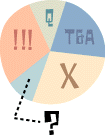|
"a fish, a barrel, and a smoking gun" |

|
News of the Weak
As the whole Diana debacle played out on CNN, there was no sight more delicious than watching "serious mainstream media" types scurry to distance themselves from the "tabloids." But nobody out there in cathode-ray land was buying it. Even supermarket-line periodical-scanners have noticed the confluence of these two supposedly polar opposites. In a remarkable show of prescience, however, the Crack Suck Research Squad set out to plumb these depths long before the Pont de l'Alma bridge replaced Jim Morrison's grave as the must-stop spot for dumb American tourists. Our objective: explaining the continued success of newsweeklies such as Time and Newsweek, despite the fact that the Internet and TV long since essentially transformed them into stale organs for redigested
news experiment results. Hypothesis: Weekly newsmagazines have mutated into upscale tabloids to match the new news environment. Assumption: Most people ignore any breaking news that doesn't affect them. Sure, stockbrokers watch their Bloomberg screen like sharks because it makes them millions, politicos track issues for potential photo-ops, and the media consume news because ... well, because otherwise we'd have to get around to actually working. But everybody else is too busy hitting sales quotas and trying to perfect their antidepressant cocktails. Materials: Suck's research team tracked both Time and Newsweek for a 10-week period this summer, using the National Enquirer as a control for - and model - of pure pap. Methodology: Basically, we, uh, looked at the covers. While it's hardly a rigorous approach, Suck's budget prohibited actually buying entire issues. And that's how the average supermarket-shopper scans the mags, anyway. (You want rigorous methodology? Read American Demographics.) In evaluating the covers we used three criteria: Actual News - i.e., whether it related to something that happened the previous week Q-rating - the box-office value of the persons pictured Anguish - i.e., the degree to which the cover might engender overt or subliminal fear among readers
Results: Actual News Value: All three magazines were essentially indistinguishable in this regard. Time and the National
Enquirer news-based covers, while Newsweek had four. The two "news" magazines' covers chose the same lead story only three times - on the Mars Pathfinder landing, Bill Gates saves Apple and Andrew Cunanan's killing
Gianni Versace Enquirer also gave cover play ("Gay Killer and Tom Cruise"). Granted, the Enquirer's "Demi Caught: It's 3 a.m. No Bruce. No Bra. No Problem?" and "Lisa Marie Suicide Drama" aren't exactly hard news, but we also gave Time credit for spinning George Soros' playing Mr.
Fix-it George and his Unlikely Crusades."
Q-rating Results: Not surprisingly, the National
Enquirer here, and even got bonus points for the skillful introduction of Tom Cruise into the story on Cunanan. Newsweek fought a valiant battle, though, with over half its covers given over to celebrities ranging from Will Smith to Cunanan to Bill Gates. And Newsweek did win the Gratuitous Celebrity subdivision. Its "Cigars Are Cool?" scored a triumph of cover treatment by matching a thrice-tired trend with equally overexposed silicon starlet/tongue exhibitionist Jenny McCarthy. Then "The New Rich" featured Gates, Oprah, David Geffen, and a score of other tycoons, trouncing the Enquirer's Di-Demi-Fran Drescher-Jane Fonda cover "Breast Surgery Secrets: Whose Are Real ... Whose Are Fake." Time came in a sorry last with only four celebrity covers, though it gets some props for snagging definitive celebrity Madonna's meandering meditation upon Gianni Versace's death.
Anguish Index: Fear and tragedy played a big part in all three magazine's cover stories. Once again, the Enquirer won the race with six tragedy-fueled covers, including "Farrah Drug Agony" and "JonBenet Rape Shocker." But it was a slim victory. Newsweek scored five such fronts and got the visual knockout prize for its bloody-ground- beef-under- Saran-Wrap "Can This Meat Kill You?" Time also notched five unsettling covers, including "The Death of Privacy" and the unlikely "Mormons, Inc.: The Secrets of America's Most Prosperous Religion." Conclusion:
While usually thought of as semi-stolid news compendiums, Time and Newsweek have kowtowed to the same mentality driving tabloids, brewing up a bouillabaisse of celebrity and latent fear to keep readers entertained. While critics complain of pap, your average American only really wants enough news to keep them from looking stupid at the water coole
r deliver exactly that. During the experiment's phase, both Time and Newsweek also unloaded a couple of their classic bogus-trend stories. Covering the Lilith Fair, for example, Time just could not resist the unequivocal declarative subhead "Macho music is out; empathy is in." Tell it to the Wu-Tang Clan. It's precisely such sloppy over-reaching that most defines newsweeklies. In 1991, for example, Time launched the myth of anomie-ridden "Twentynothings"; six years later, they debunked the very fallacy they had forwarded, proclaiming "The so-called Generation X turns out to be full of go-getters who are just doing it - but their way." Keying off their own experiences, the pundits assume everybody else will swallow up news sources as fast they manifested themselves. It's like putting Marv Albert in charge of updating the Kinsey Report. Don't trust news junkies to judge America's appetite for news. But then again, you probably shouldn't trust the news, either. courtesy of Prolex |
|
![[Search Suck.com]](search_b.gif)
|
||
|
|
||
|
|
![[net.moguls Link]](moguls30.gif)
|
|
![[Fresh Fish. If you clicked here, I might make more money. You love The Fish, admit it. Now click. Click, I say!]](fresh_fj.gif) |
![[now i know what it was....]](a0000002.gif)
![[now i know what they said ...]](b0000001.gif)
![[tangent #2: let's develop some kind of music survey-no point intended of course]](c0000001.gif)



![[Fish Image]](fish3000.gif)
![[Netscape Inbox Direct]](inbox000.gif)
![[The Barrel. Can't get enough? You should visit the Barrel.]](barrel30.gif)
![[The Gun. Buy stuff from us. I say, Buy!]](gun30000.gif)

